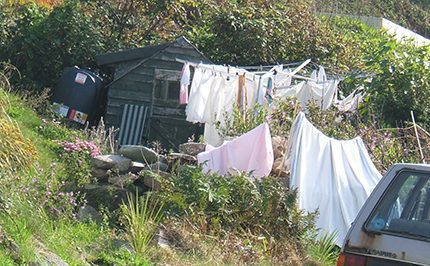“It’s a no brainer. It would invalidate our insurance. While we give our customers as much helpful information as we can to make arrangements for replacement, no matter how long they have been with us or how valued, we will not fill until a replacement has been installed.”
Kevin Bennetts, Consols Fuels, Cornwall
“Dodgy tanks, dodgy payers, they often run in tandem. I try to avoid both these days; they’re never worth the grief they can cause.”
Chris Bingham, Craggs Energy, West Yorkshire
“Our approach has always been to rely on the judgement of our drivers, who are best placed to assess the true risk of a spillage or personal injury.
“Where there is a genuine risk to a driver, we have no hesitation in refusing to deliver, but the grey areas tend to be on the general age and condition of the tank in relation to leakage risk.
“Where we feel there is a significant risk of tank failure, we ask the customer to sign a disclaimer which states our concerns. On the two occasions this year we have presented the disclaimer, the customer has asked us to replace the tank in question with a new one.”
Jodie Allan, James D Bilsland, Glasgow
“Tanks that we deem dangerous or environmentally hazardous, we refuse to fill. Farms used to be the worst culprits, but with the introduction of quality assurance visits incorporating cross compliance, a lot of these issues have been rectified. In addition, FPS’ credit checker has an unsafe delivery point indicator to enable members to see delivery points that shouldn’t be filled until remedial action has been taken.
“When a driver is on site, it’s within their remit to conduct a risk assessment of the tank and delivery point. Should the driver find the tank to be cracked, bulging or unsafe then he will not conduct the delivery and will inform us. We will then contact the customer.
“However, drivers are not OFTEC trained and shouldn’t be expected to know all the relevant rules and regulations. With more customers turning to the internet and self-installing, they do not necessarily meet OFTEC rules and regulations. Many non-conforming tanks are good installations but can’t conform as space won’t allow it.”
Grant Lockie, Johnston Oils, Edinburgh
“We deliver to many different locations, sizes and conditions of tanks. It’s crucial that not only can our driver effect a safe execution of delivery, but also have confidence that the integrity of the tank is robust.
“There are a number of elements that can affect a safe delivery, such as the position of the tank, blind fill, gauge, ullage, fill pipe etc. If any of the elements pose an issue, our drivers can refuse to deliver, as the last thing we would want is a spillage or contamination that could potentially put the property, customer or driver at risk. As always in these cases, we would seek a resolution with the tank owner to ensure any issue is rectified.”
Ben Casey, Barton Petroleum, Northamptonshire
“The short answer is yes. Our drivers are issued with a clear instruction in their handbook which lists approximately 20 points for safety and environmental checks for the tank and delivery area. If any of these points make execution of the delivery difficult or dangerous, then a written report is to be completed and submitted to the customer and to the depot supervisor on his return. The driver is told in his instruction to ask himself the question – is it safe to deliver? If the answer is no then he must not do the delivery.”
Stephen Gommersall, Ingoe Oils, Lancashire
“We assess every situation on its own merits. If we feel the tank is unfit or unsafe for filling we will advise the customer of the problems and look to provide professional and knowledgeable advice on the safety issues involved. This we believe will benefit both parties to move forward.”
Anonymous, Scotland
“Drivers are told to report back to the office if they have any concerns on the safety aspect of tanks they are sent to fill, i.e. poor access or unsafe ladders. They also are asked to check plastic tanks for cracks, metal tanks for corrosion and are required to report any environmental issues e.g. commercial and agricultural tanks that should be bunded, but are not.
“We then contact the customer and advise them of the changes that must be made before we can refill their tank. In extreme cases, drivers are told not to fill the tank and report their concerns to the office – this applies mainly to new customers.”
Looking for new tanks? See the Fuel Oil News 2013 Directory for a comprehensive list of tank manufacturers and suppliers.
